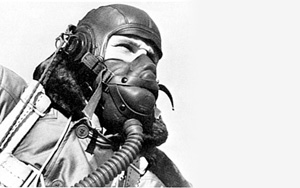 –I wrote the bulk of the following post before my cancer diagnosis and the experience of chemotherapy and radiation. Had I done so afterward, it might have been entirely different. More on that below:
–I wrote the bulk of the following post before my cancer diagnosis and the experience of chemotherapy and radiation. Had I done so afterward, it might have been entirely different. More on that below:
Some aviation phrases are just so damn beautiful that the great bard of San Francisco, Lawrence Ferlinghetti, actually named a book of poetry after one of them. “Time of Useful Consciousness,” is the aviation term that refers to the length of time a person has to make decisions once deprived of oxygen (such as a sudden loss of cabin pressure).
An airplane can de-pressurize due to a number of reasons, the most common one being some kind of malfunction in the pressurization system itself. But if a passenger manages to wrangle a door open (impossible in an airborne airliner but easy in a small plane), or the hull of an airplane is breached, or the windshield in the cockpit gets smashed to bits by a flock of fat geese, the cabin’s air rushes out the hole and is eventually replaced by the freezing air outside. But the cold isn’t what gets you. It is the fact that there is very little oxygen at the altitudes where most metal birds fly.
I have had an almost lifelong case of chronic fatigue syndrome, which I am not using your valuable time of useful consciousness to complain about. Often, my chronic fatigue severely limits my time of useful consciousness (which I will heretofore abbreviate as TOUC, in order for you to maximize your own TOUC). I am pretty worthless on any day prior to 11am, and even then you may find me wandering aimlessly wondering where I am and what I am supposed to be doing. Waking up is something I rarely do completely, unless I have to do something like fly an airplane or take a test, although I have been known to do the latter half asleep (often, actually).
Clearly, I am conscious from the moment I wake up, but throughout the day if my consciousness were soil there would be very little that could grow in it. I do have bursts of lucidity, which I have learned to treasure when they come. They remind me that while my body aches I am not yet brain-dead, which is a delightful thought. Typically, it is in these little microbursts that I get the most work done.
One key I have found is to know what kind of work I can do under which physical circumstance. If I am studying something that I want to remember, I must do it caffeinated and in a moment of UC. There are times that I am fairly confident will not be useful, and they typically come around 3 or 4 in the afternoon. When I used to spend whole days seeing one client after another, I eventually stopped scheduling clients at 4pm. At first I thought that if I scheduled a manic client, or someone with a severe case of optimism, I could get away with it, but that didn’t work either. I tried meditating at 4 for a while, which was good, or occasionally napping, which was awesome, but I always had to re-caffeinate and wash my face with cold water before seeing my 5 o’clock.
Making consciousness useful, it seems, is largely about knowing when it is necessary to don the oxygen mask. Sometimes the oxygen mask is a cup of coffee, sometimes it is a nap. For some lucky folks it is exercise, although for those with chronic fatigue that rarely works.
By the way, the actual time of useful consciousness depends on how high you are flying. At 40,000 feet, roughly the altitude most airliners fly, you will have only 15 to 20 seconds before you pass out. That is why pilots are trained to grab their oxygen masks as the very first thing on their checklist. But, if your door happens to open in a small, pressurized airplane humming along at about 20,000 feet, you will have about 5 to 10 minutes before your luck runs out. And, if you are flying in a small, unpressurized airplane at about 10,000 feet, you will likely be fine for at least a half an hour.
–The experience of cancer and its treatment has changed my perspective on useful consciousness. More than ever, it has become necessary to carefully tune to the body’s signals. There is only a small window in which one can push past the fog before doing so leads to a deterioration of function. “Chemo brain” is a real side effect of chemotherapy, although I have never attempted to learn the physiological explanation. One is awake, but in a perennial haze. Memory deteriorates—especially short-term memory, as does comprehension. It is like losing 20 IQ points or more.

Fascinating! My period of low consciousness is after lunch until about 4 pm! I read and nap usually, now that I am 80! Yikes! 80?
Ira, I was thrilled to hear about your recovery from cancer, and I very much admire your strength and positive outlook on life throughout your illness. Hope you can now enjoy life even more, since the storm is over. It would be nice get together to celebrate!
With kind regards (currently from Germany, back next week)
Vera
Yes!!!
dear ira two essays two weeks wonderful ponderous beautifully written that really confirm for me a number of things: your personal bravery in your life to overcome and deal with long term health issues, your quiet inspiring writing so subtle so gentle and which also brings hope and smiles, your knowledge of STUFF! and the way you convey that. enjoy your Italian vacation and look forward to your next encounter with words. continued good health and blessings to you and all..Daniel x